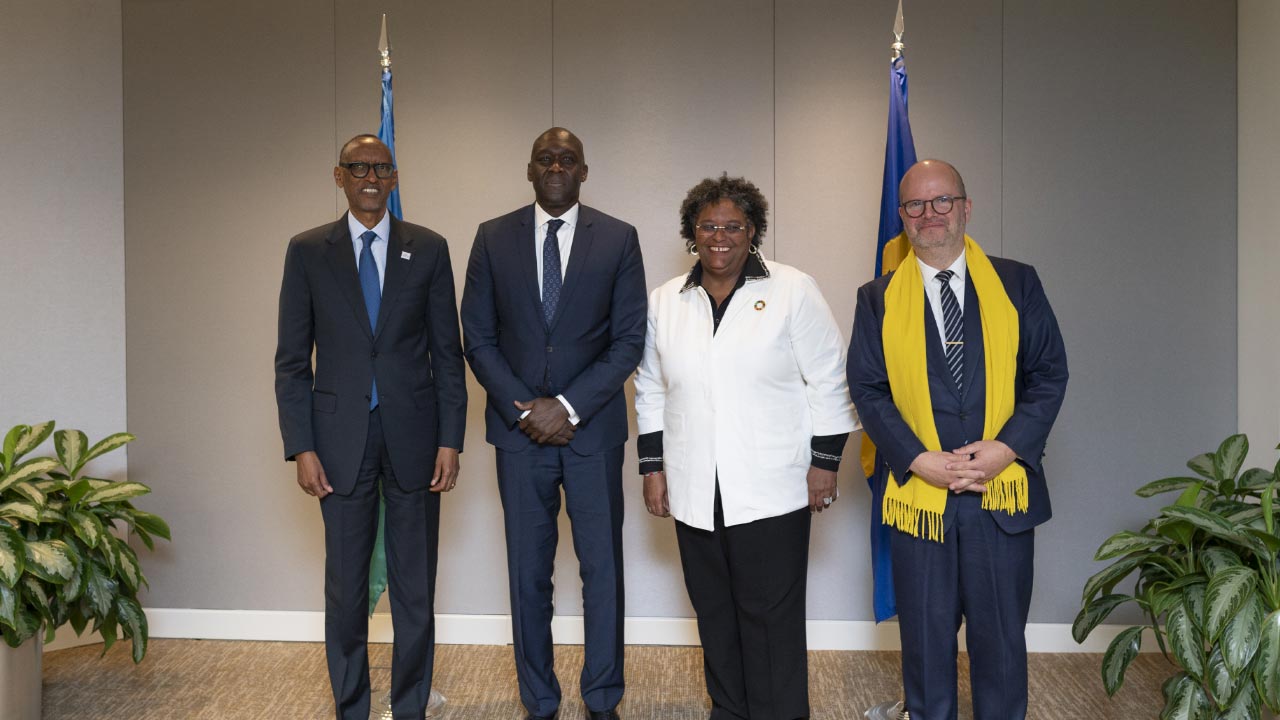 President of Rwanda Paul Kagame (left); IFC Managing Director Makhtar Diop; Prime Minister of Barbados Mia Amor Mottley; and Chairman of kENUP Foundation Holm Keller. ©Djenno Bacvic/IFC
President of Rwanda Paul Kagame (left); IFC Managing Director Makhtar Diop; Prime Minister of Barbados Mia Amor Mottley; and Chairman of kENUP Foundation Holm Keller. ©Djenno Bacvic/IFC
Washington, D.C, December 13, 2022, IFC today announced its support for a new partnership among countries in the Caribbean, Latin America, and Africa to boost the regional production of pharmaceuticals and strengthen health systems, which will require the active involvement of the private sector to succeed.
Leveraging its expertise in emerging market private sector healthcare and pharmaceuticals, IFC will seek to contribute to the transatlantic alliance for health and pharmaceutical equity established during the 27th U.N. Climate Change Conference of the Parties (COP27) by the governments of Barbados, Guyana, and Rwanda. The initiative, which is open to other countries in these regions, wants to use inter-governmental, South-South cooperation to help achieve the development and manufacturing of 60 percent of all essential pharmaceuticals for the populations of the Caribbean, Africa, and Latin America, and within their respective continents by 2040.
"The role of the private sector is critical to strengthening healthcare by making supply chains more regional and resilient, especially in pharmaceuticals," said IFC Managing Director Makhtar Diop. "IFC is already taking steps to support nations in the Africa and Latin America & Caribbean regions to build and grow their manufacturing capacity in pharmaceuticals and vaccines, and supporting this partnership only builds on that urgent mission."
Diop announced his support for the initiative on the sidelines of the U.S.-Africa Leaders' Summit, where he met with Prime Minister of Barbados Mia Amor Mottley and President of Rwanda Paul Kagame at IFC's headquarters in Washington D.C.
"By matching capacity with political will, we have created a platform that will undoubtedly benefit both Africa, and the Caribbean and Central and Latin America region, by allowing our region and the wider Global South to achieve pharmaceutical equity for our people, while providing opportunities for our citizens in this region whose expertise is in the area of sciences," said Prime Minister of Barbados Mottley. "I want to express sincere thanks to IFC and Managing Director Makhtar Diop for their support of this initiative, as I truly believe it is a strong signal to the wider world, that this transatlantic alliance to manufacture 60 percent of all essential pharmaceuticals for the people of the Caribbean, Africa, and Latin America by 2040 is one that is greatly needed."
The initiative is also being supported by kENUP Foundation, and will seek to focus cooperation on oncological drugs, preventive and therapeutic vaccines, as well on improving women's health outcomes.
"I am thankful we could come together today in support of this transatlantic alliance," said President Kagame of Rwanda. "I want to thank especially the Prime Minister of Barbados, Mia Amor Mottley, for building this bridge, and IFC's Managing Director Makhtar Diop, for his involvement."
IFC's support for the initiative builds on its current efforts to boost the ability of African nations to source vaccines and pharmaceuticals regionally. IFC has partnered with partnership with the government of Rwanda to assess how a vaccine manufacturing supply chain could be built in the country, and the Coalition for Epidemic Preparedness Innovations (CEPI), to evaluate and identify countries, partners, and projects best positioned to create commercially viable vaccine-manufacturing hubs in underserved regions, including in Africa.
In the Latin America & Caribbean Region, IFC is supporting a number of pharmaceutical companies to grow their manufacturing capacity, including to boost vaccine availability and increase access to high-quality and affordable health care products. IFC is also helping companies explore localizing a greater portion of their supply chain, with a focus on vaccines and active pharmaceutical ingredients.
About IFC
IFC—a member of the World Bank Group—is the largest global development institution focused on the private sector in emerging markets. We work in more than 100 countries, using our capital, expertise, and influence to create markets and opportunities in developing countries. In fiscal year 2022, IFC committed a record $32.8 billion to private companies and financial institutions in developing countries, leveraging the power of the private sector to end extreme poverty and boost shared prosperity as economies grapple with the impacts of global compounding crises. For more information, visit www.ifc.org.
Stay Connectedwww.facebook.com/IFCwbgwww.twitter.com/IFC_orgwww.youtube.com/IFCvideocastswww.ifc.org/SocialMediaIndexwww.instagram.com/ifc_org
Contacts
Stay Informed
Sign up to have customizable news & updates sent to you.